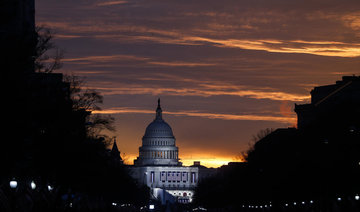LONDON: British judges on Monday agreed to block the extradition to the United States of a man accused of hacking into thousands of American government computers in a ruling that could set a precedent for similar pending cases.
Lauri Love, 33, has for several years been battling extradition to face multiple charges for allegedly hacking into the networks of the US Federal Reserve, US Army and NASA, among others, in 2012 and 2013.
“I am greatly relieved that I am no longer facing the prospect of being locked up for potentially the rest of my life in a country I have never visited,” he said following the ruling.
“But I am also thankful for the precedent that’s been set hopefully by this case.”
Kaim Todner, the law firm representing Love, hailed the ruling as a “landmark judgment.”
“The British justice system has taken the stance that we should deal with the matter ourselves, rather than accept the US government’s demands,” it said.
“It has also been recognized that mental health provisions in US prisons are not adequate to satisfy us that Lauri would not have come to serious harm if he were extradited,” the firm said in a statement.
Love, who has dual British and Finnish citizenship, suffers from Asperger’s syndrome and has also been diagnosed with depression.
After his arrest at his home in Britain in October 2013, his lawyers argued he would be prone to physical and mental danger in American prisons, and should instead face charges in Britain.
They appealed against a 2016 British court ruling in favor of extradition, subsequently signed off by interior minister Amber Rudd.
Two High Court judges now hearing the latest appeal agreed with their argument, with the decision greeted by raucous cheers from Love’s supporters who packed the court.
“Oppression as a bar to extradition requires a high threshold, not readily surmounted,” wrote Judge Ian Burnett in a joint ruling released Monday.
“But we are satisfied, in the particular combination of circumstances here, that it would be oppressive to extradite Mr.Love.”
However, the decision lays the groundwork for British prosectors to take on the case, with the judges noting “it would not be oppressive to prosecute Love in England for the offenses alleged against him.”
The defendant and his supporters welcomed the ruling.
“I’m not saying that I’m looking forward to being prosecuted but I think that there is a better chance that it will be done justly and fairly here in the UK,” Love said.
“We’re not fighting for impunity. We’re fighting for what any other defendant would expect in the UK if they’re accused of wrongdoing: that they will be treated under the law of our country.”
Naomi Colvin, of the Courage legal support group, added: “the campaign’s slogan has been ‘a trial at home’ — that’s what we’ve been asking for.”
But America may still try to force his extradition through.
The US has 14 days to lodge their grounds for appealing the decision to Britain’s Supreme Court, according to Love’s lawyers.
“We can’t really comment on the likelihood of that happening,” said Kevin Kendridge, head of extradition at Kaim Todner.
“We just have to wait for the 14-day period.”
A spokeswoman for the US Department of Justice said it was reviewing the judgment and had no further comment.
The High Court ruling could impact on other extradition requests pending against British citizens by the US.
That includes the case of Kane Gamble, a teenager who admitted last year to trying to hack into the computers of top US officials, including former CIA chief John Brennan, from his home in the East Midlands region of England.
Love said he hopes it will provide a strong precedent.
“It has been a large toll through having gone through this ordeal, professionally and personally, and in my family life.
“But I believe because we have won this victory we can look back on it and say it was worthwhile.”



























